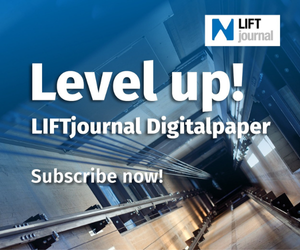Extension of the CE-marking: First, many people laughed …
The UK is back in the headlines: After a long period of calm over Brexit, some good news is now attracting attention: The British government has extended indefinitely the recognition of CE marking for placing goods on the UK market.
Of course, the question of how the UK government will deal with the new EU Machinery Regulation is also exciting. LIFTjournal interviewed Nick Mellor about this. He is Managing Director of the Lift and Escalator Industry Association (LEIA) in the UK.
How has Brexit affected the UK lift industry?
Mellor: Especially in the early days, there were some supply disruptions and of course we had similar issues as other countries with supply of certain semiconductors and other global supply chain disruptions. There has also been a tightening of the UK labour market generally.
A serious impact has been the introduction of UKCA marking. Those companies who worked to re-certify their machines, lifts and safety components for lifts to be ready for the introduction of mandatory UKCA-marking incurred significant extra costs, especially as there was initially a shortage of Approved Body (box) capacity.
The UK government has extended indefinitely the recognition of CE marking for placing goods on the UKGB market. How did this come about?
Mellor: Ever since the UKCA marking regime was announced, we have been working with the UK Government to raise our concerns about the extra costs, lack of UK Approved Body capacity, and the distraction at a time of other challenges. When we first asked for an indefinite extension to the recognition of CE-marking while EHSRs remain aligned, many people laughed. Some key industry players, which UK Government staff visited, made strong arguments which we believe really helped the UK Government to understand the problems. So, working with our leading companies and the wider UK industry, we achieved our objective.
Within the UK, there is a difference between recognition of CE-marking for UK relations such as for lifts, machinery, EMC etc. and recognition of CE-marking under the Construction Product Regulations (not covered by the recent announcement from the UK Government). The regime of product testing under CPR is very complex and, as the UK works through issues arising from the Grenfell Tower fire, it might be that a more robust regime might be required to support building safety with a need for UKCA marking if/where this diverges from EU requirements.
 Nick Mellor, Managing Director of the Lift and Escalator Industry Association (LEIA) in the UK. Photo: © The Lift and Escalator Symposium
Nick Mellor, Managing Director of the Lift and Escalator Industry Association (LEIA) in the UK. Photo: © The Lift and Escalator SymposiumWhat is the UK Government's response to the new EU Machinery Regulation? Will the UK implement, amend or even add further requirements to the EU legislation?
Mellor: The EU Machinery Regulation has been recently published and needs to be looked at by the UK Government in consultation with UK industry. LEIA’s would like to see UK regulations adopting at least the EHSRs of the EU MR. The new EHSRs of the EU MR address areas that the UK also faces with new technology, although the new EU MR has not taken the opportunity to clarify other areas of interest.
Some particular areas of interest for me:
• The new requirements for substantial modification of machines are of interest and will need industry guidance to think through their implications and to support their application.
• The clarification in the text of EHSR 6.2 for control devices is helpful especially in relation to lifting appliances not completely physically enclosed.
• Lifting appliances under the EU MR might include parts which resist the spread of fire in a building and there appears to be no EHSR to address this (EHSR 4.2 of the LD addresses this for lift landing doors but EHSR 1.5.6 of EU MR does not look to be wide enough to address this issue).
More generally the UK will need to examine each new EU Directive/ Regulation when published. We would like to see a presumption that UK regulations would be aligned and to diverge only in exceptional circumstances; for example, if there would be a strong safety argument for additional UK essential safety requirements. We have recently seen more pragmatism from the UK Government (and better engagement with industry as above) than immediately. We are more optimistic than we were, and this remains a key area for us to work together.
How will ISO 8100-1/2 be implemented in the UK – do you think it will be adopted in the same way as the other lift standards?
Mellor: Yes. BSI remains a member of CEN and ISO and is fully committed to both. As an ISO member, BSI published ISO 8100-1/-2 as BS ISO 8100-1/-2. As a CEN member, BSI will publish EN ISO 8100-1/-2 as BS EN ISO 8100-1/-2. UK delegates to CEN have worked on these standards for many years. We will continue to work at CEN on these and other EN 81 and EN 115 standards to improve them for the benefit of our industry.
As long as the EHSRs of the EU LD and UK Lifts Regulations remain aligned (there are no plans to diverge from the UK), then we expect the EU harmonised standards also to be designated standards.
As I write the recently published 2022 revisions of EN 81-21, EN 81-28, EN 81-58, EN 81-70+A1 and EN 81-77 (but not EN 81-71) have been cited in the OJEU. The list of UK designated standards was copied directly the list of EU harmonized standards at the time of Brexit, and we fully expect these new EU harmonized standards to be listed as UK designated standards.
Where does the LEIA stand between the OEMs and the SMEs?
Mellor: We have both OEMs and SMEs as members of LEIA which is the only trade association representing the UK industry. All types of members make distinctive contributions to our work.
On an international level there is for example Elevcon, for some years now the "International Elevator & Escalator Symposium", in Germany the "Heilbronner Aufzugstage" and the "Schwelmer Symposium" – where does the "Lift & Escalator Symposium" fit in?
Mellor: It is important to us that the Lift & Escalator Symposium is run not-for-profit by a charity. This allows the Symposium to advance its educational objectives and to widen participation by keeping down the costs of attending. The Symposium has fantastic support from its exhibitors which help to achieve this. The quality of papers is high – they are peer reviewed as you would expect for academic papers. The Symposium has built a very special community and we are looking forward to seeing everyone in Northampton.
What are the particular challenges for the lift industry in the UK and Europe in the light of digitalisation? In the German market, the ZÜS is concerned with cyber security – what is the situation in the UK?
Mellor: The general issues the UK faces are similar to in the remainder of Europe. The UK has a particular issue at present as legacy telephone lines are retired and replaced with fibre-optic cables. This presents problems for lift owners who are responding by widely adopting GSM-based alarm communication systems when they have to change.
And the lack of skilled workers? The LEIA is very active in education and training ...
Mellor: We continue to see strong demand for our Distance Learning technical courses. The growth during the pandemic has continued which has been very encouraging. Good employers are committed to improving their people.
In recent years, the UK has introduced a new structure for apprenticeships, and we have worked hard with key employers to define the new standards for apprenticeships in our industry. The lift and escalator apprenticeship is currently being revised and is benefitting also from the contribution of LEIA Assessment which we set-up to deliver the assessment of an apprentice at the end of their apprenticeship. We are very pleased with their progress and very proud of our support for employers, apprentices and apprenticeship training in our industry.
The interview was held by Ulrike Lotze.
More information: www.leia.co.uk
After the Brexit, Notified Bodies in the UK became "Approved Bodies". This means approvals from UK Approved Bodies are no longer recognised in the EU.


























Write a comment